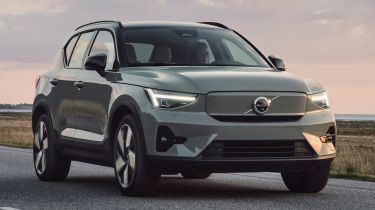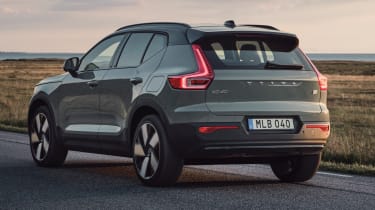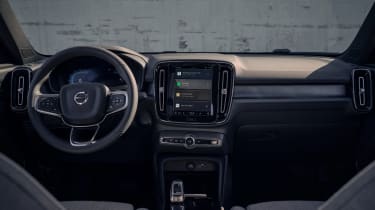New Volvo XC40 Recharge Single Motor 2022 review
The XC40 Recharge Single Motor goes to show just how quickly both the SUV and pure-electric segments evolve

Verdict
There’s no aspect of the XC40 which is terribly bad, but at this price it should have a better range and more accomplished driving dynamics. The XC40 remains a good option in internal-combustion engine form, which could be further cemented with a cheaper facelift version, but so far it’s struggling to make the transition to full electrification.
When we first sampled the all-electric XC40 Recharge in 2020, it was in its range-topping dual-motor P8 guise. We thought more modest, cheaper versions would be the pick of the XC40 EV range so now with this new single-motor version, Volvo has its chance.
The dual-motor P8 comes with a 75kWh battery with 402bhp and 660Nm, and we found it to be a little much for the XC40’s chassis, so the Single Motor’s 69kWh capacity battery with 228bhp and 330Nm of torque should be a more suitable match.
Performance figures for the XC40 Recharge Single Motor look decent enough on paper - a 0-60mph time of 7.0 seconds would’ve been hot hatch territory not that long ago. However, the 0-62mph time is 7.4 seconds - which gives you a hint to the high speed tail-off the XC40 Single Motor suffers from. On the motorway, overtaking is never worrisome but you’d never call the Single Motor rapid. Even off the line where most EVs excel, it’s fairly steady.
Used - available now
Sitting on the CMA (Compact Modular Architecture) platform the XC40 Recharge uses a passive suspension set up rather than the adaptive suspension featured on Volvos further up the pecking order. The soft chassis means the Single Motor does tend to pitch under hard braking and acceleration with a fair amount of noticeable body roll in the corners as well. It’s all manageable however and while the steering is a little vague off centre, it delivers just the right amount of weight in the bends.
The flip side of this is that the XC40 Single Motor rides very well. The larger 20-inch wheels could potentially cause some unwanted road noise to transfer to the cabin, but on the 19-inch rims we tested, the refinement on offer was excellent. At higher speeds there’s some wind noise but overall the Single Motor is quite serene, just like the more powerful P8 version.
Volvo has obviously tried to simplify the XC40 Recharge’s driving experience. Like the P8 we drove, there’s no vast array of driving modes to choose from. In the Single Motor you even lose the option of changing the aggressiveness of the regenerative braking. This is a bit of a shame because some may find the system way too involved – giving you no choice but to accept one-pedal driving.
It’s probably not surprising that Volvo have made the braking system quite aggressive, because the electric XC40 models wade into the EV SUV segment a little on the back foot compared to the likes of the Kia EV6 and Hyundai Ioniq 5, given the platform shared with internal combustion engined models – not to mention its more classic upright, less aerodynamic SUV body.
The Recharge Single Motor has a smaller range than the 270-mile P8 model, with just a maximum of 262 miles available. An entry-level rear-wheel drive Kia EV6 will offer 328 miles and a Ford Mustang Mach-E RWD top out at 273 miles.
If you’re new to electric cars, the XC40 Single Motor’s interior will feel very conventional. It doesn’t have the wow factor of the Hyundai Ioniq 5 or a Tesla Model Y but it’s easy to navigate with all the key features exactly where you’d expect them to be. The fitting of interior components is excellent, but some of the materials used were a little flimsy, with no panoramic roof it’s also quite bleak in there.
As standard you get a nine-inch central touchscreen and a 12.3-inch driver display. Both screens are intuitive and quick enough but the brand’s widening use of Google’s infotainment system could improve future iterations.
We tested the Single Motor in mid-life Plus guise, which adds keyless entry and start, heated seats front and rear as well as driver assistance systems such as adaptive cruise control and pilot assist, blind spot warning, lane assist and rear collision warning. Visibility in the XC40 is good as a whole, but when parking the front sensors tend not to come to life until there’s an object very close, which isn’t great with the high bonnet level.
Like the dual-motor P8, the CMA platform allows for a seamless integration of battery technology (although we’d like a larger front boot). Rear passengers won’t be complaining about a lack of leg or headroom and the boot capacity is still commodious enough for most families.
The Single Motor version of the XC40 Recharge starts from £45,750, representing a significant cost saving on the £57,000 Dual Motor variant. There’s very little between them in terms of range and you never really miss the extra oomph afforded by the bigger battery. There’s a bit of an elephant in the room however, with the Polestar 2 being based on the same platform offering up a better interior, more range and at a lower price point.
|
Model: |
Volvo XC40 Recharge Plus Single Motor |
|
Price: |
£51,750 |
|
Powertrain: |
69kWh battery + electric motor |
|
Transmission: |
Single-speed auto, front wheel drive |
|
Power/torque: |
228bhp/330Nm |
|
0-60mph: |
7.0 seconds |
|
Top speed: |
99mph |
|
Range: |
262 miles |
|
On sale: |
Now |
Now read our list of the best electric SUVs...














